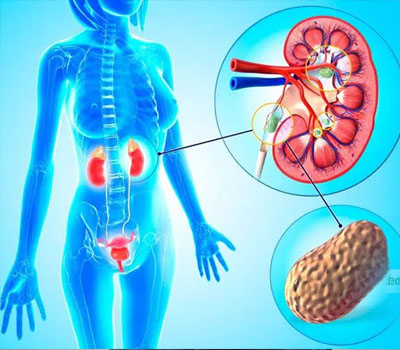Kidney Stone Treatment
- Home
- Kidney Stone Treatment

Kidney Stone Treatment
The treatment of kidney stones depends on the size, type, and location of the stones, as well as the symptoms they may be causing. Here are common approaches to kidney stone treatment:
Pain Management:
- Pain caused by kidney stones is often severe and may require pain management. Over-the-counter or prescription pain medications, such as ibuprofen or acetaminophen, may be recommended.
Hydration:
- Drinking plenty of water is crucial for flushing out small stones and preventing the formation of new ones. Adequate hydration helps dilute substances in the urine that can contribute to stone formation.
Medical Expulsion Therapy:
- In some cases, medications known as alpha blockers may be prescribed to relax the muscles in the ureter, making it easier for the stone to pass.
Observation:
- Small stones that do not cause symptoms may be observed over time. Your healthcare provider may recommend periodic imaging to monitor the stones.
Lithotripsy:
- Extracorporeal Shock Wave Lithotripsy (ESWL) is a non-invasive procedure that uses shock waves to break large stones into smaller pieces, making them easier to pass.
Ureteroscopy:
- Ureteroscopy involves using a thin, flexible scope to visualize and remove stones located in the ureter or kidney. This procedure may be done with local or general anesthesia.
Percutaneous Nephrolithotomy (PCNL):
- PCNL is a surgical procedure in which larger stones are removed through a small incision in the back. It is often used for larger or more complex stones.
Medications to Prevent Stones:
- Depending on the type of kidney stones, medications may be prescribed to prevent their recurrence. This may include medications to adjust urine acidity, decrease calcium or oxalate levels, or increase citrate levels.
Dietary Changes:
- Dietary modifications may be recommended based on the composition of the stones. For example, reducing salt, oxalate, or animal protein intake may be advised.
Fluid and Diet Recommendations:
- Increasing fluid intake, particularly water, is crucial for preventing the formation of kidney stones. Dietary modifications may be recommended based on the type of stones.
It's important to consult with a healthcare professional for personalized advice and treatment based on the specific characteristics of your kidney stones. If you experience severe pain, blood in the urine, or other concerning symptoms, seek medical attention promptly.

